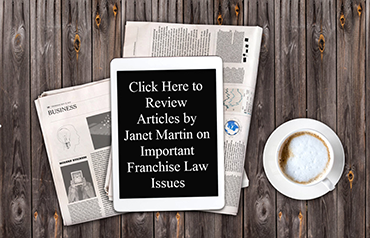California Franchise Registration
Registering and Beginning a Franchise in the State of California
You may have a successful business that has existing franchisees, and are simply looking to move into California. Or, you may be interested in taking your business to the next level by offering franchises. If you intend to be a franchisor in the State of California you will need to register with the California Department of Business Oversight (DBO). There is a comprehensive package required to submit your franchise request and gain approval of your application for a California franchise registration.
You will need the following in your application:
- Franchise Disclosure Document (FDD) Including All Exhibits
- Fee of $675
- Franchise Registration Application
- Consent to Service of Process
- Supplemental Information Page
- Franchise Seller Disclosure Form
- Customer Authorization of Disclosure of Financial Records
- Independent Auditor’s Consent Letter
- A CD that contains all of the foregoing (as well as printed paper copies)
I know, easy enough, right? My name is Janet Martin, and I have been a California Franchise Registration and franchise law attorney for more than 30 years. I can’t tell you how many times I have received a call or e-mail from a potential franchisor that starts with something like “we already have our FDD in generic form but would like you to “tweak” it for any California specific requirements and registered it.” They believe that using this template will save the upfront legal cost of creating the customized FDD. The problem is, every template I’ve reviewed is outdated, missing mandatory language, contains extra information that is off track, not allowed, and not disclosed properly. Further, the templates are so generic, most of the disclosures are not even applicable to the franchisor’s offering, yet, the new franchisor believes is it required language, when in fact, it is misrepresentative to disclose for example that you have a national advertising fund and how you operate it when you have NO advertising fund and have no intention of creating one the day you are registered to sell franchises. There is a manner in which to disclose these types of items that will be applicable to new franchisors, but only with the assistance of an experienced franchise attorney.
On the other end, new franchisors put too much information where the disclosure is required to be limited. For example, the biographical information of franchisor’s officers, (Item 2) cannot contain educational information, business accomplishments, awards, publications, or other typical information you find on a resume. Item 2 must ONLY to contain last 5 years employment history, names, dates and places, period. No more; no less. The FDD is not a sales tool. It is a mandatory form, and it cannot contain more than is required. It cannot contain less than is required.
Why Does California Require Some Franchisors to Impound Their Fees?
Another shock to a new franchisor who does not consult an experienced franchise registration attorney before embarking on their venture, is learning that new franchisors with limited history and/or limited capital in almost all cases are required by the California Department of Business Oversight (formerly California Department of Corporations) to “impound” or otherwise defer receiving their initial up front franchise fees until they have completed all pre-opening obligations; That’s right you cannot get paid until you do all the work! The State does not want the new franchisor “living off” the initial franchise fees and not being able to perform its promised services, but rather you must have the capital needed to perform the pre-opening obligations, prior to receiving the initial franchise fee. This comes as quite a surprise to new franchisors who are not able to operate without receiving the up front fees. There are circumstances however when a new franchisor can operate without this “impound” or deferral requirement. An experienced franchise registration attorney can help.
While the templates are not totally useless, the point is, there is more than “tweaking” that needs to be done with them to really make the FDD proper for California Registration and frankly just to properly comply with the FTC requirements even outside of California. While you may save some initial legal costs, this would not even take into account having a sharpened and customized Franchise Agreement and other needed related agreements. This further would not take into account the very valuable strategic consulting that an experienced franchise attorney such as myself offers. Remember, the more deficient your FDD is, the longer your franchise attorney must spend to address and fix all the deficiencies, either before it is send it for application to register, or in response to a very long detailed letter of deficiencies from the state. The better way is to get with your attorney first.
Save Time, Money and Get Your Franchise Business Moving Forward Today
If you are considering franchising a business in California, I invite you to contact me for a free consultation at 949-415-2677, or through the website contact email. I will give you an informed consultation of the information required, prepare or revise the documents and help you to move to fully registered and legally documented franchisor offering franchises in as short a time and as cost effectively as possible.


